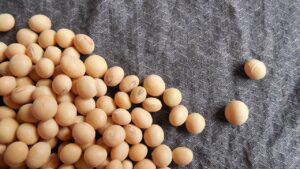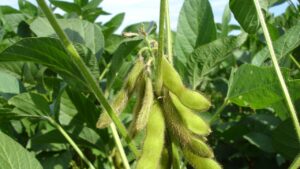Possessing the only motored bicycle in his community in 2006, George Awuni found himself functioning as an ambulance carrying sick people to the hospital, even though he worked for the Ghanaian Ministry of Agriculture’s fisheries unit. This should change, he thought, knowing that the only way to affect change was to pursue an education beyond his bachelor’s — this thought would define his future.
Awuni, now 53, was born in a modest home in the northeast part of Ghana. Bongo District. To finance his early education, Awuni planted rice for farmers, and his mother baked cakes. From that defining moment in 2006, he dedicated himself to advanced studies and attained a master’s from Tuskegee University in plant sciences, which was followed by a doctorate in plant pathology from Mississippi State University.
Now he manages the Soybean Management by Appropriate Technology (SMART) Farm component of the Feed the Future Soybean Innovation Lab near his home in Ghana. SMART Farm serves as a sub-Saharan research hub for soybean germplasm development.
Soybean breeders will use the agronomic research results obtained by Awuni and his colleagues as a platform to launch their efforts. The agronomics must be sound to properly support the breeding efforts and to provide practical information for farmers.
The SMART Farm research generates a hub of knowledge within a broad region across sub-Saharan Africa, addressing unique issues that affect agriculture and subsistence farmers. The challenge is two-pronged: to best obtain reliable research results under controlled conditions, and to transfer this knowledge into meaningful recommendations for limited-resource farmers.
Experiment Design
Awuni evaluates soil conditions and then selects sites for appropriateness, including uniformity. Next, he must determine the best management practices to use with the crop at the trial site; these must be applied in a uniform and timely manner. To the extent such challenges are overcome, plants under evaluation will express their inherent potential under the prevailing environmental conditions. This sounds similar to what any U.S. company might do, right?
But here is the rub. While new and improved varieties offer greater yield potential over traditional ones, farmers in sub-Saharan Africa might not be able to reap the full benefit. Farmers operate under such different and highly variable conditions than those in which the varieties are developed. However, for breeders to provide substantiated claims of varietal improvement, the number of factors tested and the variability within those factors must be minimized. This warrants more research on the array of conditions and realities facing limited-resource farmers.
Sub-Saharan soils are highly deficient in phosphorus, and phosphorous-containing fertilizers are not readily available. When they are, it’s often cost prohibitive. Generally, the value of applied phosphorus accrues over a few cropping cycles, yet the full cost must be absorbed at the time of purchase. This only exacerbates existing cash flow problems.
So, how much should be used, and when? Soybean plants respond best when pH levels are around 6.5. Typical soils in sub-Saharan Africa have pH levels well below this threshold. To be practical, large quantities of bulky limestone are generally applied while expectation of returns is spread over a number of years.
Liming, too, is deemed to be cash-flow prohibitive. Might there be alternative liming sources?
Knowledge of soybean response to certain bacteria containing an inoculum in the fixation of soil nitrogen is not well defined. Which bacterium provides a positive response in a given soil? What are the economics?
Will soybeans respond better if planted on the flat vs. ridges? This could depend upon water availability and the ability to control any excess water. Will seeds respond better if dropped in a hole created from jabbing a stick in the ground, planted with a dibbler or a hand-push planter?
Some suggest it’s better to develop new varieties under local farmer conditions. A “farming systems” research approach might seem appropriate but not absent a comprehensive knowledge of the singular and collective agronomic components.
In supporting the work of soybean breeders, SMART Farm manager Awuni is dedicated to “getting the agronomics right.”













